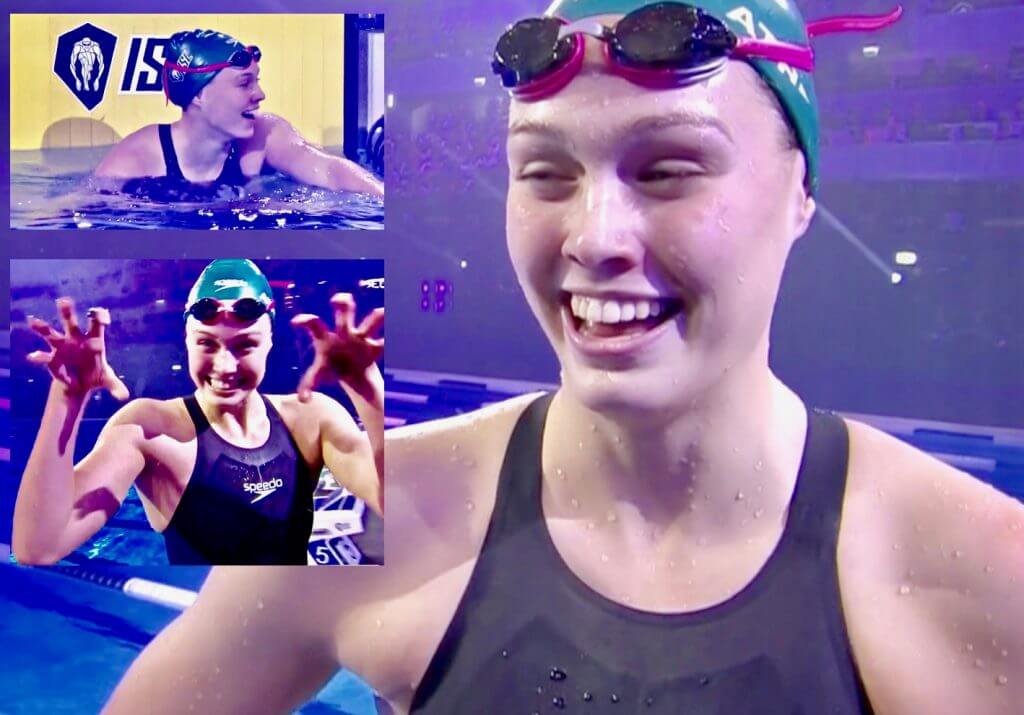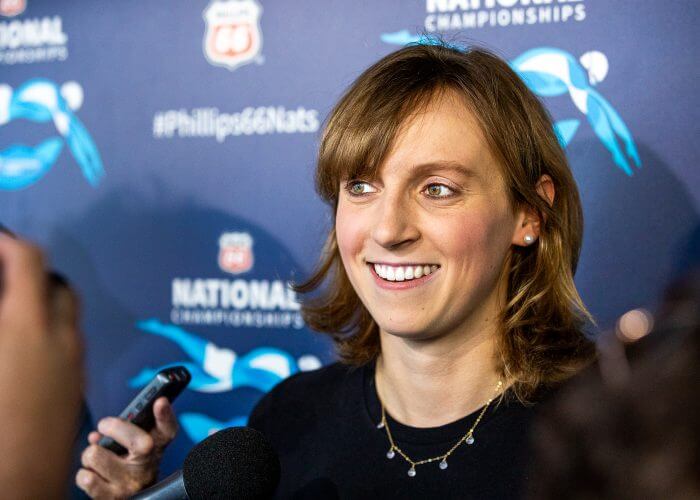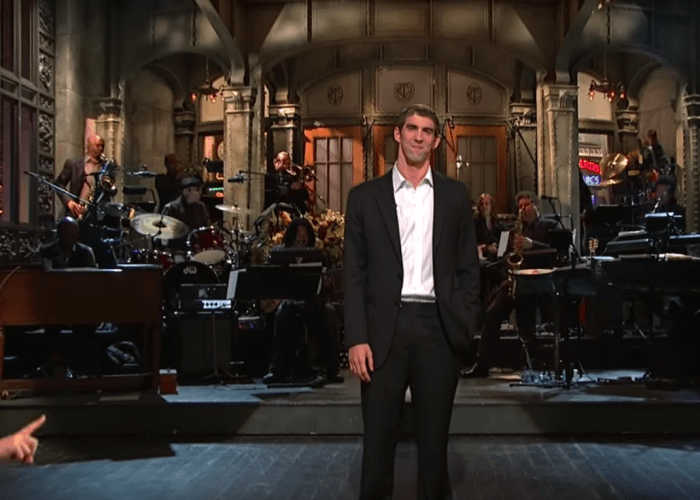Minna Atherton Tipped For $30,000 World-Record Bonus From League After 54.89 Backstroke Mark

Minna Atherton may land a performance bonus of US$30,000 for the World Record she established over 100m backstroke at the Budapest round of the International Swimming League last month.
Swimming World understands that the ISL has not yet given the green light to a sum that would match the second-biggest single amount ever handed out as a world-record bonus in the pool.
The 19-year-old, guided by Australia and ISL London Roar coach David Lush, clocked 54.89 to become the first woman inside 55sec over 100m backstroke short-course and the first League world-record breaker on October 27 in Budapest as Roar sped to a strong team victory.
While we await news from ISL, which would have to wait for confirmation that the World record has actually been ratified by FINA after indications that it would be, here is where that kind of sum would fit in the thread of swimming history on world-record prize money.
Yana Klochkova
Yana Klochkova, Ukraine’s double-double (200, 400m twice) medley Olympic champion of Sydney 2000 and Athens 2004, Yana Klochkova, remains the winner of the biggest prize handed out for a single World record, albeit one that was linked to a series of achievements required before the global-standard reward kicked in.
The European swimming league (LEN) offered a DM100,000 (about $45,000) “Superstar 2000” prize for any European swimmer who won the 1999 European short-course title, the 2000 European long-course title and the Olympic crown in the same event. It also gave a DM100,000 bonus if the superstar prizewinner set a world record to claim the Olympic title.
Klochkova ticked all boxes in the 400m medley and was rewarded with a payday of around $90,000, half of which was for the World record of 4:33.59 she set for Olympic gold on September 16 at Sydney 2000.
The standard cracked the 4:34.79 of China’s Chen Yan from 1997 and lasted six and a half years until America Katie Hoff clocked 4:32.89 for the World crown at Melbourne 2007.
The ISL and World Record Bonuses
If support for adding world-record prize money to the payment pot of the first professional league and global Pro-Team event in swimming history, Atherton would write a new line in the ISL’s developing story as the first recipient of a record reward in League waters.
ISL organisers will look at the global coverage generated by Atherton’s swim and surely understand the value of a world record in terms of how much media such pioneering moments generate. The league also has a racing-first/clock-less-relevant philosophy designed to bypass the constant pressure on swimmers (and what Ukrainian ISL founder Konstantin Grigorishin has described as a risk to athlete health) to have to produce peak, championship-performance level in order to gain serious recognition as world-class athletes.
London Roar hosts the European Derby of the League this weekend at the 2012 Olympic pool. Atherton is among a strong Australian contingent racing on the same team as Adam Peaty and Co at a match that will decide which two of the four squads based in Europe will join battle with the top two American teams, LA Current and Cali Condors, at the first-season Final Match in Las Vegas on December 20-21.
The 100m backstroke record had stood since 2014 at 55.03 to Hungarian Katinka Hosszú, captain of the ISL’s Team Iron. Hosszú is the biggest world-record bonus prize-money winner in history, having picked ups US$120,000 for the global short-course standards she set on Cup winning sprees between 2013 and 2016.
If confirmed, the prize Atherton is whispered to be in line for would match the biggest prize given out by FINA for a World record. The international federations’ scale of world-record bonuses is as follows:
- World long-course Championships: US$30,000
- Champions Series: US$20,000
- World Cup: US$10,000
Medals Vs Records

Katie Ledecky – Photo Courtesy: Connor Trimble
World-record bonus money has also been paid out by national federations in the past but the key emphasis at the Olympic Games is on medals. The biggest handouts are made by the world No 1 swim nation, the United States.
Katie Ledecky’s performance at the Rio Olympics netted her a total of $355,000 in medal awards that she was able to keep while remaining eligible to compete for Stanford.
Three other incoming or current college swimmers at that time and those Games also ended up with six-figure sums from Rio 2016: California’s Ryan Murphy ($234,375), Stanford’s Simone Manuel (just shy of $200,000) and Indiana’s Lilly King ($134,375).
Those figures take into account money from USA Swimming, which awarded $75,000 for an individual gold medal won in Rio, $30,000 for a silver and $15,000 for a bronze. For a relay event, the amount was divided equally among all members of the team, including heats swimmers.
On top of the above, there was also money from the U.S. Olympic Committee’s basic Operation Gold program: $25,000 for gold, $15,000 for silver and $10,000 for bronze. Relay medal winners also got the full amount each not a share.
G.O.A.T Michael Phelps: the biggest swim-earner of all-time

Photo Courtesy: YouTube, Saturday Night Live

Michael Phelps – Photo Courtesy: Paul Younan
As the most decorated Olympian of all time, Michael Phelps net worth is estimated this month – along with the guess-timate sums for commercial contracts – at between $40 million and $60 million, based on a estimates that he has earned $95.8 million in his life, of which $94 million was derived from advertisers, endorsements and not from performance prize money.
His then suit sponsor, Speedo, awarded Phelps a $1 million bonus after Beijing 2008 and the landing of a record eight golds on the way to a career outer-orbit-achievement total of 23 golds atop 28 medals. Phelps is said to have disbursed the money to several different charities through his organization the Michael Phelps Foundation. As such, that $1 million is not included as part of Phelps’ net worth in the estimates above.
In a list of “The Top 20 Richest Olympians in the World, 2019” – using figures from Celebrity Net Worth, and Forbes – Phelps comes in at No4 on $55 million.
At No 16 at $20m is Mark Spitz, winner of the seven golds at Munich 1972. The list does not confine itself to earnings stemming directly from athletic performance: No 1 is Caitlyn (formerly Bruce) Jenner, the Olympic decathlon champion of Montreal 1976 as a man and today, identifying as a woman, estimated to be worth $100 million.




